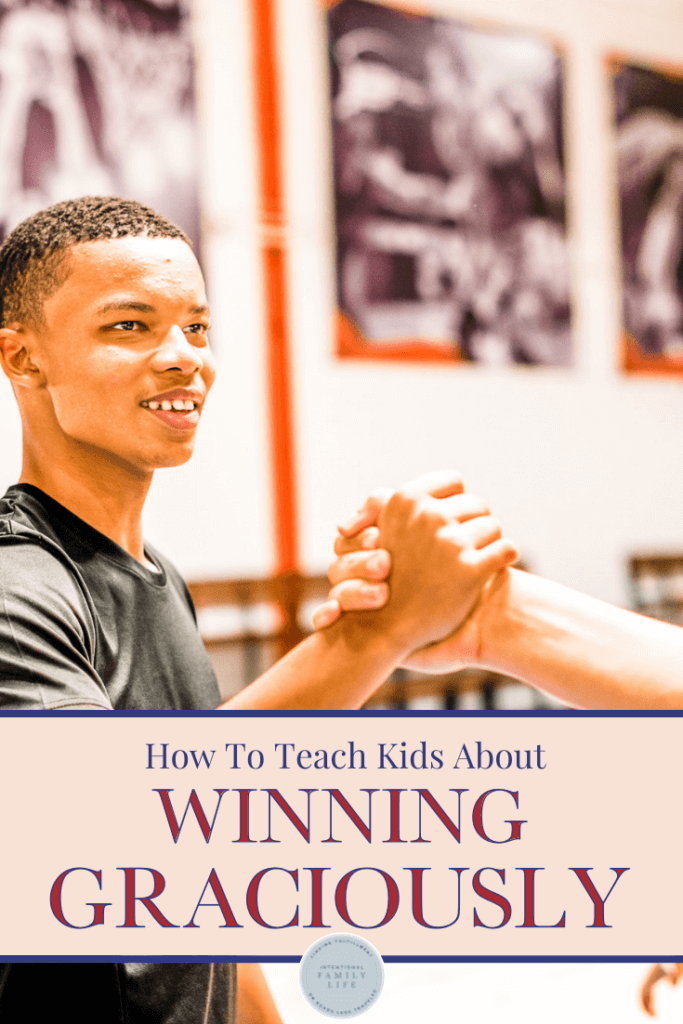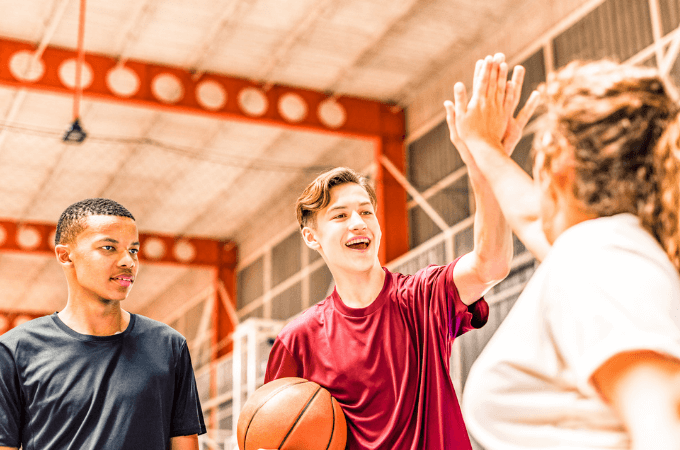Easter Egg: The younger of my two boys is one of the most competitive kids I’ve met. He wants to be first and best at ALL THE THINGS. Teaching about healthy competition for kids can be tough – nobody likes a sore loser and everyone loves a gracious winner. But there are powerful emotions involved for kids in both winning and losing. I’ve found that board games are a terrific way to demonstrate health competition for kids. Family game nights also give him an opportunity to practice the art of being a competitive kid , a gracious loser and a grateful winner.

TEACHING ABOUT HEALTHY COMPETITION FOR KIDS
Gathering family and friends around the table for a board game is a great way to nurture the family bond that you’ve worked so hard to create. Game night (or day) is meant to be a fun time for everyone playing.
But, in any game night or competition for kids, there are bound to be hurt feelings from time to time.
Here’s how to teach even the most super competitive kids to become gracious winners when playing board games with friends and family. This skill will easily translate to other games, sports, and competitions throughout life.

FOCUS ON THE GAME
Remember, “It doesn’t matter who wins or loses, it’s how you play the game?” That can feel trite and dismissive in the throws of a disappointing loss. Because to a player, it does matter who wins or loses.
But what we need to teach kids about competition, is that winning or losing shouldn’t matter more than anything else.
Even for the most competitive kids, the true reason for playing the game is to have fun.
So, regardless of who wins the game, everyone wins because they had the opportunity to play and have fun.
By teaching your child to focus on the time spent together, he will be less focused on the fact that he won (or lost) the game. This is how one therapist challenges clients to think about it:
An elementary school client of mine was anxious about a racquetball tournament he was playing in. I asked him, “What will happen after the game if you win?” He said he’d shake hands with the other player then go find his parents, who would tell him congratulations, then they’d all go out for lunch.
I asked him, “What will happen after the game if you lose?” He said he’d shake hands with the other player then go find his parents, who would tell him nice try, the they’d all go out for lunch.
I asked him to figure out how long the winning or the losing lasts. He said about five minutes. The game, on the other hand, he said typically lasts 45 minutes.
So, it makes much more sense to focus on the game—on playing well, trying hard, and having fun playing a sport he enjoys—than the brief final outcome.
Raising a Good Sport
Everyone loves to win. Winning is fun and I love to play hard and win just as much as anyone else. So do my kids. But, what we need to teach is the art of being respectful in the throws of a win.
HEALTHY COMPETITION FOR KIDS MEANS SHOWING RESPECT
For kids (and adults, too…), winning is incredibly exciting.
While hard work and practice is always something to be proud of, it is important that we teach our competitive kids how to avoid being insensitive to the feelings of others. This is the cornerstone of teaching kids respect.
The first time your child starts dancing around and yelling, “In your face, losers!” a smidgen of your insides will wither and die.
But then it’s time to get to work. It is time to bring your empathy to the game table.
Start with letting them know that you understand how disappointing it is to lose.
With older kids, you can share a story of your own disappointment at losing. Sharing your own stories can be a way to connect. Sharing your stories can help your child understand that competition for kids can be emotional. It also demonstrates to your child that you hear and understand her feelings.
Want A Fun Way To Learn More About What’s Going On In Your Tween’s Life?
If they are younger, you might want to ask if they’ve heard people speaking so disrespectfully elsewhere. If your child is younger, let them know your perspective on such talk. (I say this because if your child is older, I’m assuming they already know your feelings on the matter…)
Ask your child to remember a disappointing loss that they’ve had. Or ask them how they would feel had they lost the game, and someone else was saying the same things. Chances are, they would not be happy.
Help your child see how their words impact others, and they will certainly want to tone it down a notch. If you’re looking for some help here, check out these 15 Heartwarming Books About Kindness.
You’ll also want to remind them that they will not win every time. One day, they will be on the losing end of the competition. It’s equally important that they also know how not to be a sore loser.
In situations like this, I always ask my son, “Did your choices today bring you closer to being the person you want to be?”

GROWTH MINDSET
A growth mindset goes hand in hand with the idea of focusing on the game. Guide your kids to thinking about what they can do to change the outcome of the game next time.
Is there something they can do to change the outcome? The idea that you can take action to influence the outcome of the next game is very empowering!!
This video of Jay Williams talking about watching Kobe Bryant working before a basketball game is so inspirational!
Watch this with your kids (trigger warning: he briefly discusses a suicide attempt at the very beginning of the video).
Talk to them about working hard to accomplish something. Then they are sure to work hard in preparation for the next competition.
My Favorite Tools For Nurturing a Growth Mindset



SOME SELF REFLECTION NEVER HURTS
Kids are like sponges. They absorb everything, especially when it comes to parents and caregivers. For better or worse, what they absorb most is what they see their adults doing. What we say matters so much less.
Maybe you can think about your behavior after a loss. Remember when you didn’t get that promotion at work and your response wasn’t your finest moment as a human?
How did you respond when you lost your tennis match?
Or better yet, how do you respond when your child’s sports team loses a game?
Do you attend your child’s sports practice for the joy of watching her play, or only the games because she will understand that the win / loss is what you value over working hard and practicing?
The best way to teach your competitive kids to be gracious winners is by setting a good example yourself. This means when you win a board game or a tennis match, model the way that you would like your child to respond.
Not only do you want to keep your reactions appropriate, but you also want to praise the other players, by saying something along the lines of, “That was a good game!” You might even respond to the specific game, “I know I didn’t win, but I really enjoyed playing that game because I love using my imagination!”
Ways to Be Present Every Day With Your Kids
Grab the Cheat Sheet!
Does spending one on one time with each of your kids feel overwhelming?
Let me help make it feel easy and simple with tons of easily actionable – do it now – ideas for quality time.
HEALTHY COMPETITION FOR KIDS REQUIRES A COMPETITOR
Winning is either skill, luck, or a combination of the two. But you can always remind your child that, just by being present at a competition, their opponents push them to work harder.
Without opponents, there’s no game.
Always remind kids to be gracious to their opponents, and explain why it’s important to thank the other kids for playing.
Using board games is a great tool for teaching these ideals to competitive kids. Even the most competitive kids will catch on eventually. Board games and sports can quickly become serious business, especially if you have a competitive child.
Learning to be a gracious winner may not come naturally to all of our super competitive kids, but keep working with your child and encouraging them. It’s definitely worth it!
Don’t Forget To Pin This So You Can Come Back Later!







